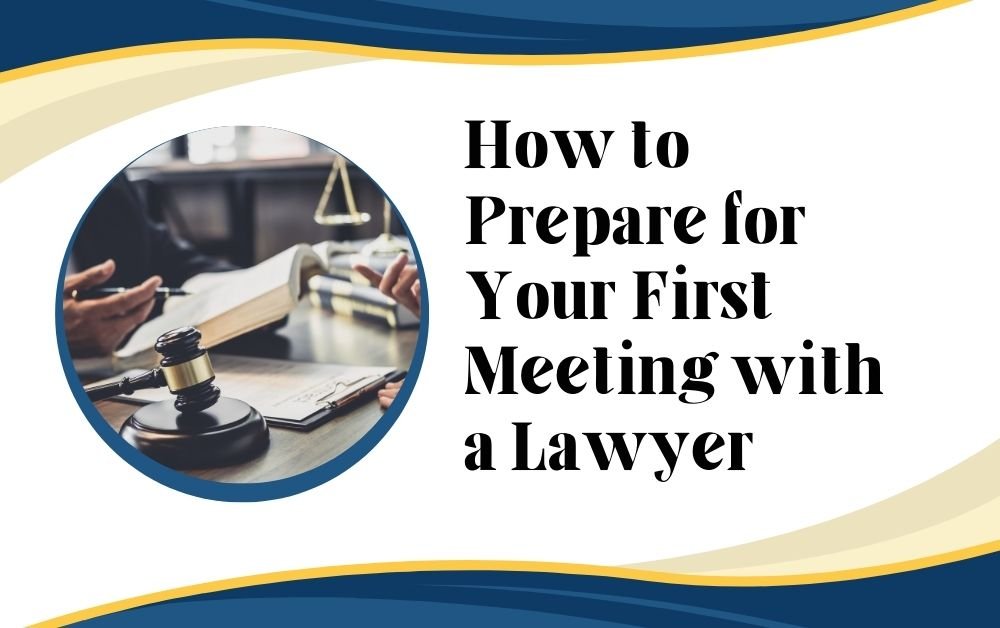How to Prepare for Your First Meeting with a Lawyer
When you’re about to meet a lawyer for the first time, it can feel a little overwhelming. You might have many questions and concerns running through your mind. But don’t worry! Proper preparation can help you get the most out of that meeting and ensure that your lawyer understands your situation clearly. This guide will walk you through everything you need to know so that your first meeting with a lawyer goes smoothly and successfully.
Why Preparation is Important Before Meeting a Lawyer
Before you step into your lawyer’s office, it’s essential to be well-prepared. A well-organized meeting will save both your time and your lawyer’s time, ensuring the conversation is focused and productive. If you walk in without a plan, you might forget to mention important details or end up feeling overwhelmed. Lawyers often charge by the hour, so making sure you’re ready will help you make the most of the time you’re paying for.
Preparing beforehand also shows your lawyer that you are serious about your case. It gives the lawyer the impression that you value their time, which could positively influence their approach to your case. The more information and documents you bring to the table, the easier it will be for the lawyer to analyze your situation and provide effective advice.
Note – For expert legal guidance and support, contact MiolawFirm, the top-rated Lawyer in Abu Dhabi, to ensure your case is handled with professionalism and care. Reach out today to get started!
Gathering the Necessary Documents
One of the most important steps you need to take before your first meeting with a lawyer is gathering all the necessary documents related to your case. These documents are crucial as they give your lawyer a clear understanding of your legal issue. The type of documents you need will depend on the type of case you have. For example, if you’re dealing with a business issue, you might need contracts or financial statements. If it’s a family matter, such as a divorce, you may need financial records, emails, or text messages.
Make sure you have both originals and copies of everything. It’s always a good idea to organize these documents in a folder or binder, so you can easily access them during the meeting. If you’re unsure about what documents to bring, ask your lawyer ahead of time. They will likely provide you with a list of what they need to review.

Preparing a List of Questions and Concerns
You likely have many questions and concerns about your case, and the first meeting with your lawyer is the perfect time to ask them. Before your meeting, take the time to write down all the questions you want to ask. Don’t rely on your memory alone; it’s easy to forget things when you’re in the moment.
Some common questions to ask a lawyer during your first meeting include:
- What is your experience with cases like mine?
- How long do you think my case will take to resolve?
- What are the possible outcomes of my case?
- How do you charge for your services? Are there any additional fees?
- What can I do to strengthen my case?
Having a list of questions prepared ensures that you leave the meeting with a clear understanding of your lawyer’s role, the next steps in your case, and what you can expect going forward.
Be Ready to Share Personal and Case Information
Your lawyer will need as much information as possible about your situation to provide the best legal advice. Be prepared to discuss the details of your case openly and honestly. This means being upfront about all the facts, even those that might not be in your favor. Your lawyer is there to help you, and withholding information can hurt your case later on.
If you’re not sure about something, it’s better to mention it rather than leave it out. You should also let your lawyer know if there’s anything particularly sensitive about your case. They can guide you on how to handle delicate matters with discretion.
Additionally, be ready to provide personal details that may impact your case. For example, in a family law case, your lawyer may need to know about your income, relationship history, or parenting situation. Providing complete and accurate information will help your lawyer form a stronger strategy for your case.
Understanding the Lawyer’s Role in Your Case
It’s essential to have realistic expectations about what your lawyer can and cannot do for you. A lawyer’s job is to guide you through the legal process, provide advice, and represent you in court if necessary. However, they cannot guarantee the outcome of your case. Many factors influence legal cases, and some things are beyond even the most skilled lawyer’s control.
During your first meeting, ask the lawyer to explain their role in your case and how they plan to approach it. This will give you a clear idea of what to expect moving forward. You may also want to ask how much involvement you will have in the process. Some clients prefer to be very hands-on, while others prefer to leave everything to the lawyer. Your lawyer can adjust their communication and strategy based on your preferences.
Discussing Costs and Legal Fees
Legal services can be expensive, and it’s crucial to understand how much your lawyer’s services will cost before moving forward. During your first meeting, make sure to discuss fees openly. Some lawyers charge a flat fee for specific services, while others charge an hourly rate. It’s essential to clarify how billing works, what services are included, and if there are any additional costs you should be aware of, such as court fees or document filing fees.
Make sure to ask about payment plans if necessary. Some law firms offer flexible payment options to help clients manage the costs of legal services. Understanding the financial aspect of working with a lawyer will help you budget accordingly and avoid any surprises later on.
Taking Notes and Following Up After the Meeting
During the meeting, be sure to take notes on the key points your lawyer makes. This will help you remember important details after the meeting and serve as a reference as you move forward. You may also want to note any tasks your lawyer assigns you, such as gathering additional documents or providing more information.
After the meeting, follow up with your lawyer if you have any additional questions or if new information comes up. Good communication with your lawyer is essential to keeping your case on track. Make sure you know the best way to reach your lawyer, whether by email or phone, and don’t hesitate to reach out if you need clarification.
Final Thoughts
Preparing for your first meeting with a lawyer doesn’t have to be stressful. By organizing your documents, preparing questions, and being ready to share all relevant information, you’ll set yourself up for a productive and successful meeting. Remember, your lawyer is there to help guide you through the legal process, so don’t hesitate to ask questions or express concerns. The more prepared you are, the smoother the process will be, and the better your lawyer can assist you.
This guide should help ease any anxieties about your first meeting and provide a clear understanding of what to expect. By following these steps, you’ll be well-prepared, making the process as seamless as possible for both you and your lawyer.
For more insightful articles related to this topic, feel free to visit newstips.co.uk






